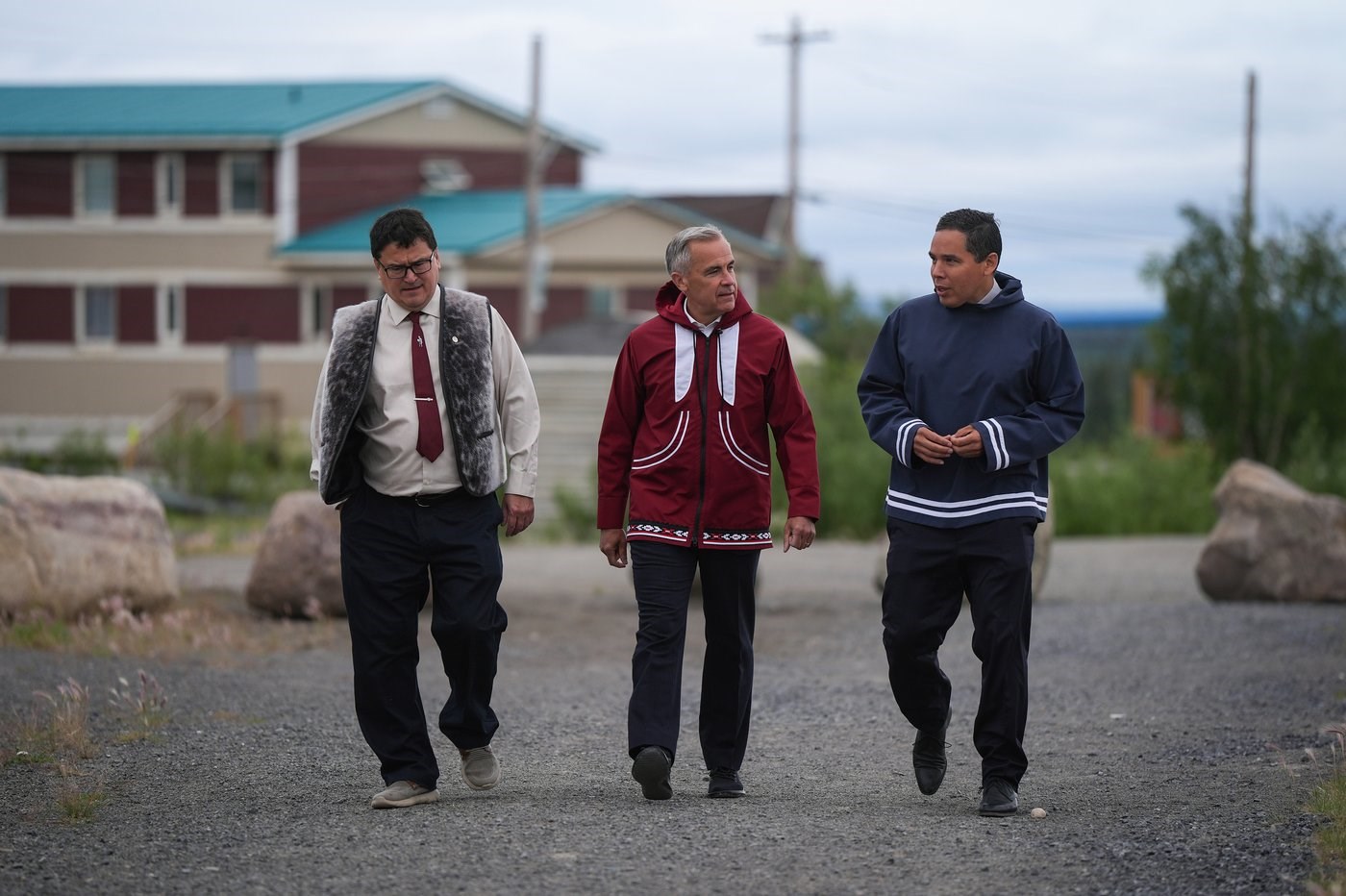
Prime Minister Mark Carney walks with Duane Smith, left, chair and CEO of the Inuvialuit Regional Corporation, and Natan Obed, right, president of the Inuit Tapiriit Kanatami, to a meeting of the Inuit-Crown Partnership Committee in Inuvik, N.W.T., on Thursday, July 24, 2025. THE CANADIAN PRESS/Darryl Dyck
Republished July 24, 2025 - 3:33 PM
Original Publication Date July 24, 2025 - 1:01 AM
INUVIK — An Inuit leader who met Thursday with Prime Minister Mark Carney to discuss the federal government's controversial major projects legislation says he has been assured the bill respects treaty rights.
Natan Obed, president of Inuit Tapiriit Kanatami, told reporters in Inuvik, N.W.T., that leaders attending the meeting of the Inuit-Crown Partnership Committee with Carney have had a "fulsome conversation" about Bill C-5.
"We've had reassurances that the bill … will not interrupt the processes under our modern treaties and that there will be full partnership of Inuit within these processes," he said.
Carney spent Thursday meeting with Inuit leaders to discuss the legislation, also known as the One Canadian Economy Act. Several ministers, including Northern Affairs Minister Rebecca Chartrand and Indigenous Services Minister Mandy Gull-Masty, also attended.
Ahead of the meeting, Inuit leaders said they had a lot to work through with the federal government.
During an afternoon break, Obed said Carney was unequivocal in saying the legislation would not violate modern treaties.
"When it comes to project reviews, the focus has been on what types of nation-building projects are Inuit interested in building, how can we identify those projects together, and then, how can we make good on those projects by implementing them," he said.
"So the prime minister and his cabinet ministers couldn't have been any clearer in their assurances to Inuit leadership about the upholding of the constitutionally protected agreements that we have with the Crown."
In a statement Thursday afternoon, Carney said the meeting was about "building our shared future and Inuit Nunangat's full economic potential."
“In partnership, Inuit and the federal government will build major projects that connect and transform our economy, create greater prosperity and opportunities and build a stronger Canada," he said.
The recently passed One Canadian Economy Act gives Ottawa the power to fast-track projects it considers to be in the national interest by sidestepping environmental protections and other legislation.
Some Indigenous leaders have accused the federal government of failing to consult with them adequately when the legislation was being drafted and amended.
Obed previously criticized the federal government over the legislation and told senators studying it last month that Ottawa has been hypocritical in its approach to reconciliation.
He said at the time the legislation didn't respect Indigenous Peoples' rights and warned that fast-tracked projects could end up before the courts.
One court challenge has already been launched by First Nations asking a judge to find the legislation unconstitutional.
Carney promised the day the bill was passed to hold talks with First Nations, Inuit and Métis leaders to get input on how projects can proceed.
After Carney met with First Nations leaders in Ottawa last week, some chiefs said they were left with more questions than answers and no clear idea of how the government plans to implement its agenda.
Before Thursday's meeting got underway, Carney said there was much work to be done on closing infrastructure gaps and improving social services in the Arctic, and warned the region's security is under threat.
He also insisted that Bill C-5 "fully respects" treaty rights.
"It fully respects treaty-based environmental assessment processes," said Carney. "In fact, those will be essential for anything that we move forward.
"What the act does is it creates conditions for the federal government to be more effective and efficient in our part of the partnership."
During the meeting, leaders also discussed infrastructure needs, Canada’s Arctic Foreign Policy and protecting Inuit security and sovereignty in the Arctic. The federal government announced its new Arctic ambassador, Iqaluit resident Virginia Mearns.
Foreign Affairs Minister Anita Anand, who also attended the meeting, said Mearns will play a key role in protecting Canada's Arctic sovereignty.
Anand said she attended the meeting because the committee touches on many themes that apply to both Canada's foreign and domestic agendas.
Obed's group, which represents the interests of Inuit in Canada, has voiced concerns about another wave of militarization of their territories, similar to the one during the Cold War that forced relocations of Inuit communities, property loss and disruptions to traditional ways of life.
ITK has said that Inuit want to help defend Canada against foreign threats but in a way that respects local realities.
Obed said he last year spoke with the Trudeau government about possible names for an ambassador and was "very pleased" with the choice.
"Virginia Mearns is going to be an incredible contributor in diplomacy at this point in time for Canada," he said.
"She's an Inuk from Nunavut. She also will bring that Inuit perspective to any room that she's in, whether here in Canada or abroad."
— With files from Alessia Passafiume and Dylan Robertson in Ottawa.
This report by The Canadian Press was first published July 24, 2025.
News from © The Canadian Press, 2025